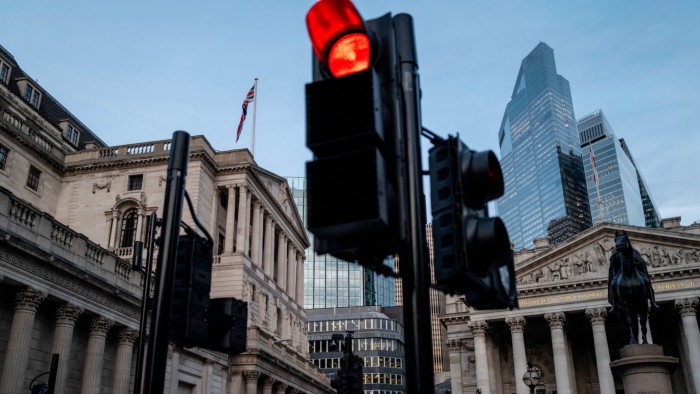Unlock the Editor’s Digest for free
Roula Khalaf, Editor of the FT, selects her favourite stories in this weekly newsletter.
The Bank of England is facing growing calls to scale back its bond-selling programme later this year, as investors warn it risks pushing up borrowing costs further and adding to pressure on a weakening UK economy.
The central bank is shrinking its portfolio of bonds accumulated during bursts of quantitative easing over the past decade and a half, as it attempts to bring its balance sheet back to a more normal size.
Unlike the Federal Reserve and the European Central Bank, the BoE’s so-called quantitative tightening (QT) effort entails active sales of bonds, rather than simply allowing holdings to mature. Investors argue this is pushing up yields on longer-term government debt during a volatile spell for global bond markets, raising borrowing costs across the economy even as the central bank lowers its benchmark short-term interest rate, and adding to the strain on public finances.
“The Bank of England should stop active QT,” urged Ben Nicholl, a senior fund manager at Royal London Asset Management.
The BoE’s Monetary Policy Committee is due to set its next 12-month plan for QT in September, which will take effect the following month. It has been reducing its stock by £100bn this year to £560bn, through a mixture of active sales and letting old debt roll off.
If QT continues at the same pace, active sales will need to rise to £52bn in the year from October from £13bn in the current year due to a smaller stock of maturing debt, according to Nicholl.

Active sales on that scale could “reignite market concerns about the total amount of gilts, particularly long maturity gilts, that the market may have to absorb this year”, he said.
Mahmood Pradhan, global head of macroeconomics at Amundi Asset Management, said the Bank of England was “attempting to reduce the size of its balance sheet more rapidly than it needs to and could come under pressure to show some flexibility”.
He added: “The BoE should not stick to a pre-determined programme of QT but be ready to adjust in the event of exogenous shocks, such as contagion from US bond yields.”
Andrew Bailey, the BoE governor, on Tuesday told a House of Lords committee that the central bank would shortly start an internal review of the programme ahead of its September decision.
Market participants on average expect the pace of QT to slow to £75bn in 2025-2026, according to a BoE survey in April.
Bailey said the decision on QT “is going to be more interesting this year” because of the pressure on long-term government debt, although he said that the process of shrinking the BoE’s balance sheet was not to blame for the rise in gilt yields, which has mirrored moves in other big bond markets.
Fellow rate-setter Catherine Mann said in a speech this month that it was important to consider QT and BoE interest rate decisions together, “especially at a time where these two tools are acting in different directions”.
Fund managers point to the UK’s long-term borrowing costs, which at more than 5 per cent on the 30-year bond are already the highest in the G7, as a reason to act.

“While [the BoE’s] balance sheet reduction is part of the broader normalisation process, it shouldn’t operate on autopilot, if doing so risks destabilising the very markets it relies upon” to transmit its monetary policy, said Fraser Lundie, head of fixed income at Aviva Investors.
Long-term government debt has been a pressure point across global markets. The UK’s 30-year borrowing costs reached their highest since 1998 in the fallout from Donald Trump’s “liberation day” tariff blitz, and long-dated yields have risen faster than short-term rates. The UK has already responded by scaling back its long-term debt issuance.
Mark Dowding, chief investment officer for fixed income at RBC Bluebay Asset Management, called for the BoE to “scrap” active sales, which he said put “upward pressure” on yields.
The BoE’s handling of the unwinding of its quantitative easing programme also has implications for the public finances, already under heavy strain. Bailey has rebuffed analysis from economists that the overall programme is too costly compared with those of the Fed and other central banks, emphasising the longer-term benefits of QT.
The BoE declined to comment.
Recommended
The combination of issuing fresh gilts to fund the budget deficit while selling central bank bond holdings is a “big and sustained ask” of bond markets, said Neville Hill of consultancy Hybrid Economics.
“Given the level of borrowing costs and their febrile nature — in part thanks to the gargantuan borrowing needs of the US — this seems, to put it bluntly, bonkers,” he said.



